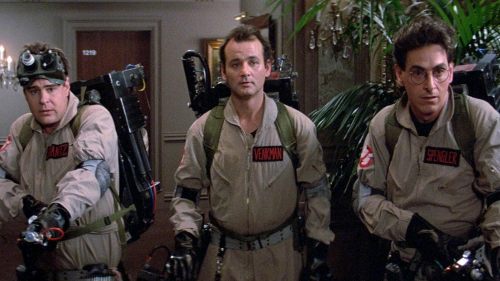Collins’ Crypt: 2017 Drawn & Quartered: The Beginning
I'm not sure what the bigger story is here: that we had two of the biggest horror smashes in ages in the first third of 2017, or that this might be the most populated "Drawn & Quartered" piece yet. I count a whopping seventeen releases, which is one for every weekend being counted - and that's leaving out big budget monster flicks The Great Wall and Kong: Skull Island, which each had a couple of scare scenes but were squarely planted in the action/adventure genres. Sadly, the news wasn't great for most of these films, and it proves once again that glutting the market with horror flicks only divvies the audience up, resulting in a lot of underwhelming grosses. It's the same reason we don't see a lot of horror movies in October anymore - the studios got wise to the fact that even then, fans don't want to show up every weekend. When we actually have a lot of options, we just get choosy, and no one wins.
As is almost always the case, the first weekend of the new year gave us a horror film, usually from Screen Gems. This year's was Underworld: Blood Wars, the long-awaited 5th entry in a series that until now had stuck to an "every three years" cycle. This one was a full five years after the last entry, Awakening, which was a baffling decision on Sony's part as that one was the highest grossing entry yet, proving the audience was still there and even growing - why wait so long to return to the well, especially when it had a cliffhanger ending? The long wait resulted in that film's conclusion being more or less brushed off (Michael Ealy's ally character from Awakening just disappears entirely), picking up from some unknown point in the future, as if there WAS another movie in between that we missed somehow. Whether or not that contributed to the film's underwhelming box office is unknown (the movie itself was a worthy addition to the series that you either love or don't, at this point), but when it opened at #4 (behind a few films that had been playing for weeks) with a mere $13m, it was obvious that the planned sixth film was in jeopardy. Its ultimate $30m gross (with another $50m from overseas) was enough to put the film in the black, but barely - if they do continue the series, I wouldn't be surprised if it was a low-budget, possibly even direct to video enterprise with Kate Beckinsale's Selene either written out, recast, or reduced to a quick cameo.
Screen Gems must have felt slightly better when the final grosses for ATX's The Bye Bye Man came in, as it also made $13m on its opening weekend but only managed to tally a final gross of $22m - at least Underworld managed to more than double the gross of its first three days. Not that Bye Bye Man deserved any better; after a solid opening sequence, the film completely fell apart, offering generic paranormal scares, horrendous CGI effects (a character being immolated might be the worst effect I've ever seen in a theatrical movie), and one of those plotlines that only work if every single character (including the police) refrain from behaving like human beings. Worse, it was dreadfully boring, with pretty much every big scare moment already shown in the trailer - except for those seen in the aforementioned prologue, which seemed like it was transplanted from a better, ballsier movie. I can cut the movie some slack since it was cut from an R to meet PG-13 requirements, but the tame violence and lack of swearing wasn't one of the movie's problems (and, not surprisingly, the extended cut did not fix any of the film's narrative/character issues), so it ultimately doesn't matter which version you watch - it'll still be a bad movie. Thankfully audiences knew to largely stay away, so we can be spared any sequels.

After these two underperformers, the genre got a nice shot in the arm thanks to Split, which opened with a whopping $40m - Blumhouse's biggest opening weekend ever for a non-sequel (don't get pedantic). Buoyed by James McAvoy's terrific performance as a man with 23 identities (though we only see about a third of them) and the revival of Shyamalan's brand after the well received The Visit, it ultimately grossed $138m, topping all previous Blumhouse releases in the process. And it did so with a fairly tight lid on the film's fun reveal at the end, which has since been blown out of the water with news of its sequel, which will unite the cast of Split with characters from ______ (leaving it out JUST IN CASE someone's still in the dark). As a Shyamalan fan (the only one I flat out disliked was Lady in the Water, though I haven't seen Airbender) I couldn't be happier that he's made a creative comeback, and the huge grosses are just icing on the cake. Whether it can last without another relapse like he suffered in the middle of the '00s remains to be seen, but all that I care about right now is: since he's hot again, can we PLEASE get the 2nd "Night Chronicles" movie?
The following week, Resident Evil: The Final Chapter learned the same lesson Underworld's team did - it's better to stick to the normal schedule if you want your normal grosses. While the four previous Resident Evil sequels all launched in September, two or three years apart, and grossed around $50-60m a piece, they opted to release this alleged finale in January. And like Underworld, it had been five years since the last film, eroding a lot of that "Well I guess I should see it since I've seen the others" habit that keeps these kind of franchises alive, as it debuted with a mere $13m, limping its way to about $26m when all was said and done. Unlike Underworld, however, the domestic indifference was not matched by the more forgiving (or less discriminating?) overseas audiences, who treated the film like the event it promised to be, propelling it to a massive $312m gross worldwide, with more than half of that coming from China alone. While it's the lowest grossing one here, it's actually the highest grossing entry of the series for worldwide grosses, suggesting that Resident Evil: A New Beginning might be in our future, perhaps with more Chinese heroes for Alice to team up with and then discard (as with Underworld, the previous Evil's cliffhanger was largely ignored here, and all of Alice's allies from that movie just disappear without fanfare).
Split aide, you might have noticed that all of these movies made $13m on their opening weekend, as if that was the most a studio could expect to attract with these middling releases. The long-delayed Rings continued this odd tradition (make your own "unlucky" jokes), a number that could not have made anyone at Paramount happy, as they had been testing and reshooting this thing for years - even often paying the test screening audiences - to get it into shape and hopefully revive this long dormant series. All for a lousy $27m final gross - less than the (itself underwhelming) Ring Two made it on its opening weekend. Once again overseas audiences softened the blow, adding another $55m to the pot, but even that paled in comparison to the last film, let alone the blockbuster original. Personally, I'm torn as to whether or not it or Bye Bye Man is the worst genre film I've seen theatrically this year; Bye Bye Man at least had some originality to offer, whereas this gave us... uh...

OK, Rings is the worst genre movie this year.
Sadly, it wouldn't be the last time I had to think "The Ring was so good, why is this so bad?", as that film's director Gore Verbinski made his own return to the genre with A Cure To Wellness, an attempt to revive Hammer-style mad scientist narratives, filtered through the filmmaker's well-known (and often lauded) idiosyncratic ways. Unfortunately no one filtered the runtime, so what could have been a nutty 85 minute movie (i.e. what it would have been if Hammer had actually made it) became a two and a half hour slog, with its impressive production design and gonzo finale not offering nearly enough in exchange for the languish pace. It was nice to see a major studio (Fox, in this case) drop $40m on an original R rated movie without any big stars, but with no one reigning Verbinski in, it was all for naught, and audiences just stayed home. It ultimately grossed a mere $8m, and broke a record for 3rd weekend theater drops in the process - grats, I guess?
When I lambasted the film on Twitter and the like, I noticed that people would argue in a very muted way, agreeing that the film didn't really work but that people should see it anyway because it was nice to support R-rated original horror from a major studio. While I'd agree (and have probably made similar pleas in the past, albeit for movies I actually liked that no one was seeing), there are two problems with it. One is that even if the movie made 300 million dollars we wouldn't get strange horror/thrillers in the same vein - we'd just get a bunch of shitty mad scientist/creepy hospital movies (plus, in fifteen years, A Cure For Wellnesses), because studios never learn the right lessons from success. And two, a week later we got Get Out, an original R rated movie that had the benefit of also being really goddamn good. If Wellness was some lone hope for originality in a year with no others, there might be some weight to the argument, but come on. Just go see Get Out.
And you did! The movie not only had a great opening ($33m, already deep into profit given its $5m budget) but it kept on going, a rare horror film that didn't sink like a stone after its first week regardless of quality. As of this writing it's up to $173m domestically and just starting an overseas run, good enough to be the highest grossing R rated horror film since The Exorcist (a couple others, like Hannibal, sneak past it with inflation). Not bad for a filmmaker's debut film (Jordan Peele, in this case), and the good folks at Blumhouse must be ecstatic to see their Split record broken so soon by another (and cheaper!) of its productions, putting all their competition to shame on a fraction of the cost. As I mentioned earlier this year, the Trump administration will, if nothing else, at least pave the way for a number of politically minded horror films not unlike Nixon's did during the '70s, and while Get Out was produced before he was elected, it's inadvertently a great start to what could be an interesting period for the horror genre. Even if the film tanked, those who saw it would be championing it; that it was a gigantic smash (I'm still kind of amazed to see how much it made. It outgrossed Kong, even!) is just icing on the cake.
If there's one downside to the film's monster success, it's that there wasn't any room for any of the horror films that followed over the next month or so. The Belko Experiment (from Blumhouse's Tilt label) had some buzz thanks to writer/producer James Gunn and its intriguing "Office Space meets Battle Royale" premise, but audiences didn't really bite, as the film only grossed a mere $9m (even director Greg McLean's previous film, fellow Tilt production The Darkness, performed better). I thought the film was mostly a win, though I think I expected more dark humor from Gunn's script, which curiously didn't really utilize the "office" element for much of the narrative. The terrific cast (including John C. McGinley, an actual Office Space vet) kept me entertained, and there were a number of great practical gags, but it wasn't enough to really be crushed when the film failed to catch on - I was just happy it outgrossed A Cure For Wellness.

The failure of Life was far more disappointing to me, as I am tired of having to settle for Syfy original movies whenever I want to see an Alien ripoff. And that's really all the movie was (with minimal attempts to hide it - they even used a similar title treatment), but I didn't mind - it's not like we're being inundated with these things in our multiplexes (not counting Prometheus, the last one was probably Apollo 18, all the way back in 2011, and that was found footage nonsense anyway). Sometimes it's just fun to see the crew of a spaceship being killed off one by one by something they brought on board, dammit, and plus it had a terrific (read: surprisingly super dark) ending, the likes of which we see even less often. I knew the film wouldn't be a huge smash (if only it *was* a prequel to Venom!), but I was certainly hoping it would make more than a pitiful $30m (overseas wasn't much better). I will optimistically believe people were just waiting for the real deal with Alien Covenant.
Speaking of Alien, Ridley Scott lent his name to Phoenix Forgotten, a found footage movie about the 1997 Phoenix lights incident. I'm not sure who thought that audiences were still into found footage movies on a mass scale, but for what it's worth it's actually one of the better ones of the past few years. They really nail the most important parts of these movies, to the point where I really believed that some of the footage was not staged but taken from an amateur UFO hunter (with the abduction angle being grafted onto it), and the characters were actually charming instead of annoying, as they are in most FFers. Alas, the narrative itself wasn't quite as compelling, and The Visit aside, people seem to have no desire to see these things anymore, so its $3.4m gross is, if anything, probably more than I was expecting.
The other films were all limited releases, so naturally their grosses can only be so high. Some worth highlighting though, starting with Colossal, which has hit $2.5m (and counting) despite only playing on 327 screens - a fine start for Neon, who picked Nacho Vigalondo's terrific "monster movie" as their first theatrical release, with hopefully many more to come. Fellow Fantastic Fest favorite Raw also scored $514k on only 45 screens, which is great for a foreign language horror film (especially one with taboo subject matter, cannibalism in this case), and while I don't know what Massacre on Aisle 12 is, a $20k gross on a mere 3 screens is pretty good, I think. Less impressive was The Blackcoat's Daughter, which made the same amount but on nearly 10x as many screens, though with a Netflix premiere date on the books I'm sure many just opted to wait for the cheaper option. And just last week, something called 7 Witches opened, earning 1$0k in four locations - anyone see it?
So if you released a horror movie in the past four months you're probably disappointed with your box office returns unless you're Jason Blum, but again: we had a lot to pick from over such a short period of time. Not every horror fan is as committed to seeing everything as I am (and I missed most of the above limited releases), so if they have to pick and choose, there are bound to be losers. It's nice to see that the three biggest grossers (Get Out, Split, and Life) were original films while the sequels floundered, as it will hopefully have studios stop relying so much on franchises when it comes to horror - I truly think those days are behind us, and have little faith that the upcoming sequels to Saw and Insidious will turn things around (as for Amityville 17 or whatever number it is - LOL). The more exciting horror projects coming along are the originals - 47 Meters Down (from the director of the underrated Other Side of the Door) and It Comes At Night will hopefully live up to expectations and pay off at the box office. But then again, I know we will all be there for Tom Cruise fighting The Mummy, so ignore everything I said about originality.



